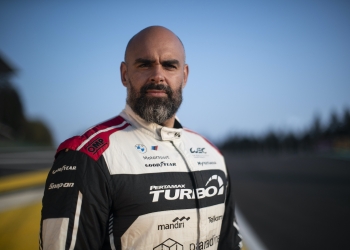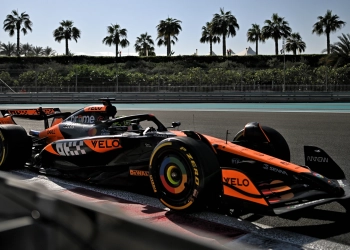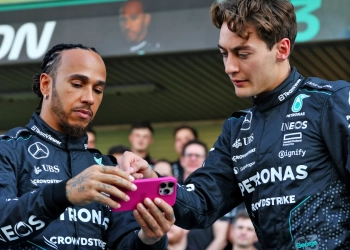Q. Do you think there is a specific problem with the car that is preventing you from getting the most out of it?
Felipe Massa: “It’s definitely not a very easy car to drive and it’s hard to find a good balance. Many times I have found myself having to fight the car and, in these circumstances, it’s easy to lose a tenth here and there: with my driving style maybe I struggle a bit more, because I don’t manage to find a smooth way of driving. Then, it’s well known that we don’t yet have enough aerodynamic downforce and we are lacking in traction at the exit to slow corners, which could be the biggest problem. In Spain, we made a significant improvement, which could clearly be seen from Fernando’s performance in the race, but I too, when I had a clear track ahead of me, had a good pace. We also made a little progress in terms of top speed, another area where we have suffered right from the start of the season.”
Q. Can you feel the team has faith in you and what do you need to get out of this difficult phase?
FM: “Absolutely, yes, I feel the whole team stands by me. Obviously, they are not happy with the results and neither am I: we all want is to get out of this and return to normal. It’s possible and for sure it’s what I want and I know that with the team’s help we will manage it.”
Q. It’s a difficult question, but equally, it’s one that, one way or another, needs to be asked. Has there ever been the doubt in your mind that you are no longer as quick since the accident in Budapest?
FM: “I have asked myself that forty five thousand times and don’t think I haven’t and why wouldn’t I: having won so much over three years, eleven races, the question is obvious. And it’s not as though I only stuck to asking myself: I went looking for the answer, asking a whole host of questions and undergoing as many medical examinations. All the doctors I consulted are prepared to swear hand on heart that there are absolutely no traces of the impact with the spring. As for myself, I don’t feel in any way different to the way I was before that weekend. For example, if it was true that I no longer had the same will to win as before or the same courage, then how can one explain the fact that, at the race start, I am probably still one of the best drivers and I am not the sort to hold back when it comes to overtaking?”
Q. It’s been almost thirty years since we have seen five winners in five different cars in the first part of the season: where do you think this unpredictability comes from?
FM: “I think it’s great for the show, because many more teams are competitive. I think that the many changes over the past few years, both the technical and financial ones, have contributed in a decisive fashion. Up to a few years ago, those who did not have a big budget had no chance, but today it’s no longer the case and I think that will continue in the future, also because the trend is moving towards reducing costs still further, given what is going on in the rest of the world.”
Q. Is tyre performance really that unpredictable and important?
FM: “Yes, but their influence varies from circuit to circuit. In Bahrain and Spain we had high degradation and then the tyres played a decisive role, but at others, where degradation is more within the norm, then I think the quickest car in absolute terms will have the upper hand. Having said that, clearly those who do the best job of managing the tyres, have the best strategy and make no mistakes, will have the best chance of winning.”
Q. Monaco is your second home race. What does it feel like driving a Formula 1 car on the same streets where a few days earlier and after this Grand Prix, you might find yourself going for a walk with your son?
FM: “On normal days, you don’t feel you’re on a track, apart from at the Loews hairpin, where the kerbs are always in place. When you drive through there you always have in mind that you are actually on the Grand Prix track. Everywhere else you never think about it. Obviously now, you are pretty much on track as the barriers and kerbs have already been installed. Felipinho knows this is where I race, but he is only interested in me being able to drive like in Mario Kart so as to pick up the bonuses! We spend ages playing that video game…”
Q. What does it feel like to produce a perfect lap, to take pole position at a track like Monaco?
FM: “It is fantastic and I am very sorry I was unable to win that time in 2008, when I managed to start in front of the whole field. The rain and the Safety Car certainly didn’t do me any favours, because I had a good enough pace to win. That lap the day before was really amazing, something I will never forget. Just finishing the race in Monaco is already a good result, but winning it is something that makes you part of history.”
Q. Today, you are in Maranello to work on the simulator. What is the programme for the day?
FM: “It’s nothing to do with the next round, partly because it is almost impossible to reproduce in detail on the simulator what is the real Monaco. We are working mainly on a back-up to the Grand Prix in Barcelona to confirm the data we saw there last weekend.”
Q. Do you agree with your colleagues, first and foremost Fernando, who maintain that one day of real track testing is worth a much larger number of days on a virtual one?
FM: “Absolutely, a hundred percent! Nothing can replace driving on a track and I don’t just say that because, as a driver I have more fun on a track, as I think the engineers also agree with me…”
Q. Does this race require a different approach to the others?
FM: “Yes especially from the physical point of view. The Monaco Grand Prix is a very long race where you don’t get a moment to relax, because you are always on the limit, always brushing the barriers. So I work a lot more than usual on aerobic training, especially over a long time. From a technical point of view, the car set-up has some rather specific characteristics: only the race in Singapore takes place on a track with any similarities to the Monegasque one.”






